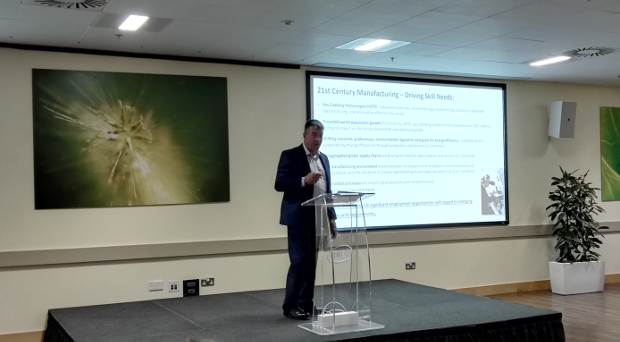A new training programme has been launched by Fastrack to IT (FIT), Intel and the Kildare Wicklow Education and Training Board (KWETB), that will train and prepare candidates for advanced manufacturing industries in Ireland, supported by SOLAS.
The further education programmes will train manufacturing maintenance technicians in a 48-week course that is Level 6-accredited by QQI, with a unit award from City and Guilds. There is also a 12 week integrated work experience element.
The programme will target advanced manufacturing in areas such as electronics parts and chips, plastics, pharma/bio-industries, bulk chemicals, packaged goods, electrical components, control systems and others.
Diversity focus
A key element of the programmes is to make such careers more attractive to young women, as well as those who might be returning to work or changing disciplines.
In recognition of the fact that university is not the only route into high-tech sectors such as semiconductor and pharmaceutical manufacturing, the programmes will look to attract individuals with multidisciplinary skills and good problem solving abilities.
Eamon Sinnott, vice president and general manager Ireland for Intel, said that Irish factories are now “a well spring of technical ability,” far from the situation decades ago where a career started in a factory was often what resulted when people did not do well in education.
“Importantly,” said Sinnott, “this new collaboration will also seek to actively drive a greater representation of female participation in this technical expertise – something which is vitally important for Intel and indeed the entire tech industry”
Unemployment insulator
Emphasising the importance of skill development, Fiona Hartley, executive director, SOLAS, said that the organisation “sees skills as an insulator against unemployment”. She said the manufacturing maintenance technician skills programme “is an excellent example” of the SOLAS integrated services strategic plan that is ensuring further education and training is “responsive to the emerging needs of employers and candidates”. Level 5 and 6 skills are an important intermediate step to higher skill development, said Hartley.
Paul Sweetman, director of ICT Ireland, said that Ireland is now a global destination of technical professionals who wish to expand their industry experience, with international media such as Forbes ranking Ireland among the best countries in the world in which to do business, with highly availability of skills and adaptability among the workforce.
The programme was officially launched by Damien English TD, Minister for Skills, Research and Innovation, who described it as “the type of positive education and training partnership that this Government has long encouraged and promoted, particularly in the ICT sector.”
Skill reliant sector
“The potential of this sector, like all sectors, is largely reliant on the skill-sets available to meet the constantly evolving requirements of the industry. The willingness and the ability of employers such as Intel Ireland to be proactive in identifying their specific skill needs and then to work collaboratively with the education and training system to ensure that young unemployed people have the opportunity to gain the right skills and also to gain valuable work experience in the ICT Sector is crucial.”
Peter Davitt, CEO, FIT, highlighted the opportunity in advanced manufacturing, citing 5.6% growth per anum in manufacturing, as well as the IDA valuation of exports from manufacturing of €78 billion in 2012.
Best outcomes
Davitt said that the key to such initiatives in further education and training was collaboration between industry, certification and training bodies. Only with such collaboration are the best outcomes achieved and new opportunities created, said Davitt.
“FIT would like to acknowledge the strong engagement and expert input of Intel in developing the programme and the support and enthusiasm of Kildare and Wicklow of Education and Training Board in implementing the programme. The initiative clearly demonstrates how effective collaboration between industry and training provision can address the skill needs of the economy in a timely fashion and create new employment opportunities for people throughout the country,” said Davitt.
TechCentral Reporters







Subscribers 0
Fans 0
Followers 0
Followers